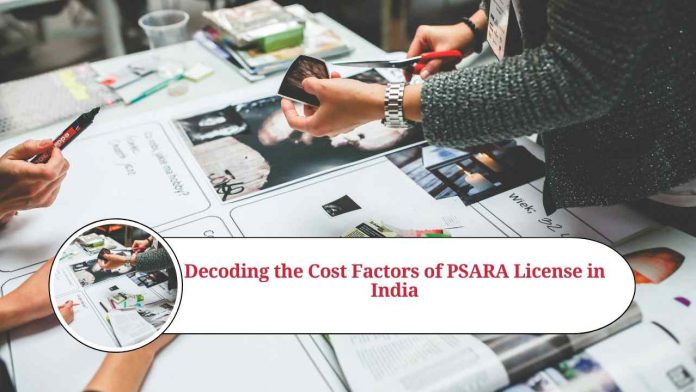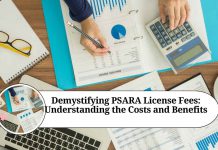Introduction:
In India, private security agencies play a crucial role in maintaining law and order, protecting assets, and ensuring the safety of individuals. These agencies are regulated by the Private Security Agencies Regulation Act (PSARA) of 2005. As per the PSARA, it is mandatory for private security agencies to obtain a license to operate legally. However, acquiring a PSARA license involves certain costs that agencies need to be aware of. In this blog post, we will delve into the factors that influence the cost of obtaining a PSARA license in India.
- Application Fee: The first expense involved in obtaining a PSARA license is the application fee. The fee may vary from state to state and is usually non-refundable. It covers the administrative costs of processing the application and conducting the necessary background checks.
- Security Deposit: Along with the application fee, private security agencies are required to provide a security deposit. The deposit acts as a financial guarantee and may be utilized in case of any non-compliance or violation of regulations. The security deposit amount can also vary based on the state where the agency is operating.
- Infrastructure and Training Costs: To obtain a PSARA license, private security agencies must fulfill certain infrastructure and training requirements. This includes having a registered office space, necessary equipment, and trained personnel. The cost of setting up the infrastructure and providing training can vary depending on the scale and scope of the agency’s operations.
- Background Verification: Background verification of the agency’s owners, directors, and key personnel is a crucial part of the licensing process. This involves conducting thorough checks to ensure that individuals associated with the agency have no criminal records or involvement in any unlawful activities. The cost of background verification services may vary depending on the agency hired and the number of individuals being screened.
- Legal and Documentation Expenses: Private security agencies need to maintain various legal documents and records to comply with the PSARA regulations. This includes maintaining employee records, contracts with clients, insurance coverage, and more. The expenses associated with legal and documentation requirements may vary based on the size of the agency and the complexity of its operations.
- Renewal and Annual Fees: After obtaining the initial PSARA license, agencies are required to renew it periodically, typically every year. Renewal fees are payable to maintain the validity of the license. Additionally, there may be annual fees or charges associated with the license, which contribute to the overall cost of compliance.
Conclusion:
Obtaining a PSARA license in India is a necessary step for private security agencies to operate legally and ensure the safety of their clients and employees. However, it is essential to be aware of the costs involved in acquiring and maintaining the license. These costs can vary based on factors such as the state of operation, the scale of the agency, and the regulatory requirements. By understanding the expenses associated with the PSARA license, private security agencies can plan their budget effectively and ensure compliance with the relevant regulations.
Read more useful content:
Frequently Asked Questions (FAQs)
What is a PSARA license?
A PSARA license is a mandatory license required by private security agencies in India to operate legally. It is issued under the Private Security Agencies Regulation Act (PSARA) of 2005 and ensures that the agency complies with the necessary regulations and standards.
Who needs to obtain a PSARA license?
Any individual or organization intending to provide private security services in India, including security guards, surveillance services, and other related services, needs to obtain a PSARA license.
What are the eligibility criteria for obtaining a PSARA license?
The eligibility criteria for obtaining a PSARA license may vary from state to state. However, generally, the applicant must be an Indian citizen, have a clean criminal record, and fulfill the prescribed financial and infrastructure requirements.
How can I apply for a PSARA license?
To apply for a PSARA license, you need to contact the respective controlling authority designated by the state government. The authority will provide you with the necessary application forms and guide you through the application process.
What are the documents required for a PSARA license application?
The documents required for a PSARA license application typically include identity proof, address proof, proof of financial stability, details of infrastructure, employee records, and any other documents specified by the controlling authority.
How much time does it take to obtain a PSARA license?
The processing time for a PSARA license can vary depending on the state and the completeness of the application. Generally, it may take several weeks to a few months for the entire process, including verification and approval.
How much does a PSARA license cost?
The cost of a PSARA license can vary based on the state and the scale of operations. It typically includes application fees, security deposit, infrastructure and training costs, background verification fees, and renewal fees. The overall cost can range from several thousand to lakhs of rupees.
Can a PSARA license be transferred?
No, a PSARA license is non-transferable. It is issued to a specific individual or organization and cannot be transferred to another party. If there is a change in ownership or control of the agency, a new license application must be submitted.
Is it necessary to renew a PSARA license?
Yes, a PSARA license needs to be renewed periodically, usually every year. Renewal involves paying the prescribed renewal fees and providing updated documentation to ensure compliance with the regulations.
What happens if a private security agency operates without a PSARA license?
Operating without a valid PSARA license is illegal and can lead to severe penalties, including fines and imprisonment. Additionally, clients may be reluctant to hire security services from unlicensed agencies, affecting the agency’s reputation and business prospects.




















